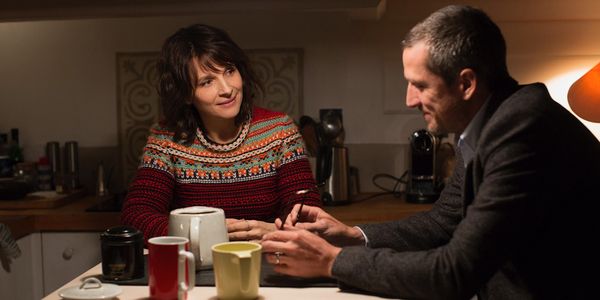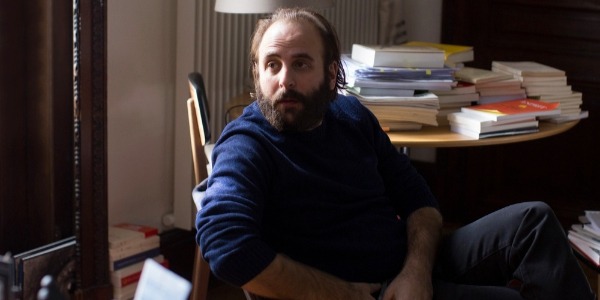NON-FICTION: Assayas’ Delightful Palate Cleanser

Midwesterner, movie lover, cinnamon enthusiast.
Following Olivier Assayas’ pair of metaphysical Kristen Stewart-starring pictures, Clouds of Sils Maria and Personal Shopper (the strongest period in his career, to date), is Non-Fiction, a breezy, loquacious comedy between French bourgeoisie that’s smaller in scope but finds the director exploring art with a consistently global perspective.
Taking place almost entirely indoors around Parisian homes, offices and cafes, book publisher Alain (Guillaume Canet) and his wife Selena (Juliette Binoche), an actress in a police procedural program, bedhop with others in the publishing world, including an author whom Alain refuses to keep publishing.
But Non-Fiction is less about the dramatic unraveling of these characters’ relationships and more about the discussions they have regarding the changing world around them, particularly focused on the literary industry — readership practices, market demands, genre trends, etc. I couldn’t help but wed it with another 2019 film, Steven Soderbergh’s High Flying Bird, which is just as verbose and is likewise more interested in discussing an industry in flux (a professional basketball league) than developing its characters.
A Faux Departure
While High Flying Bird’s debates about professional basketball contracts and agency relationships were often not so discreetly doubling as Soderbergh wrestling with the current landscape of film production and distribution, Assayas’ film doesn’t lend itself so easily past the subject at hand, at least subtextually. Here using literature, like he did with fine art in Summer Hours, cinema in Irma Vep, ceramics in Les destinees and manga in Demonlover, Assayas bounces old ideas against modern ones to think out loud about the general existence of art and commerce in our lives.

Summer Hours is undoubtedly the film in his oeuvre Non-Fiction most closely resembles. While not as somber a film, Non-Fiction likewise finds Assayas restrained in form, lacking the quick, patchwork editing of loose handheld shots and elliptical fades he perfected through Irma Vep, Demonlover and Boarding Gate, often set to Sonic Youth guitars, calcifying into a gliding, hip style that enmeshes characters with their urban environments.
It’s also absent of the multicultural cast or conversations that bind two or three languages, but as with Summer Hours (and Les destinees), the exclusively French gang of intellectuals are preoccupied with ideas and implications of globalization. Assayas uses these conversations, shot in unfussy compositions, to propel his essayic narrative, which he called “a series of dialogues about the modern world.”
Weathered Optimism?
“I did not want to make a film that had anything to do with this notion that things were better before. Deep inside me I have this trust in the future, this trust in the process of life,” the filmmaker told Pop Matters in an interview for 2009’s Summer Hours. I don’t necessarily think time has weathered Assayas’ optimism in the world, but Non-Fiction suggests a frustration with other people’s lack of trust in the future.

Alain begins the film hopeful, or at least open to the idea that the publishing world’s digital transformation isn’t inherently bad for the industry nor a bad sign of people’s habits. He spouts maxims like, “Everything must change for things to stay as they are,” and cites a quote about needing to be the janitors of art as it passes through time — an impetus to maintain it, preserving it from proverbial decay. But by the end of the film, Alain is only interested in sales. And likewise, his wife Selena, who — while not as optimistic about the publishing industry and online habits — postured throughout the film to bloat the importance of her TV program, has completely given up such airs.
Non-Fiction: Conclusion
Even if Non-Fiction doesn’t end up being a revelatory film in Assayas’ catalogue, it’s never uncompelling. And though he claims to not have originally written the film as a comedy, it’s often quite funny — particular in-gags about The White Ribbon and Binoche as a real-life star being highlights — scratching the same itch Woody Allen films did for me as a teenager, seeing attractive, well-to-dos at parties with things to say to one another. The film even has a weird, inane, cosmological denouement Allen had an unfortunate knack for, but the difference here is that Assayas’ naturally mature and modest approach to light comedy are refreshingly not contingent on self-deprecation.
Though distinctly different than his previous two films, Non-Fiction, because of its scope and style, ends up feeling less like a new chapter for Assayas and more like a stop-gap — a transitional film that acts as a clearing of the throat or palate cleanser between courses, but a delightful one nonetheless.
What are your thoughts on Non-Fiction?
Non-Fiction opens in the U.S. on May 3 in select cities.
Does content like this matter to you?
Become a Member and support film journalism. Unlock access to all of Film Inquiry`s great articles. Join a community of like-minded readers who are passionate about cinema - get access to our private members Network, give back to independent filmmakers, and more.













